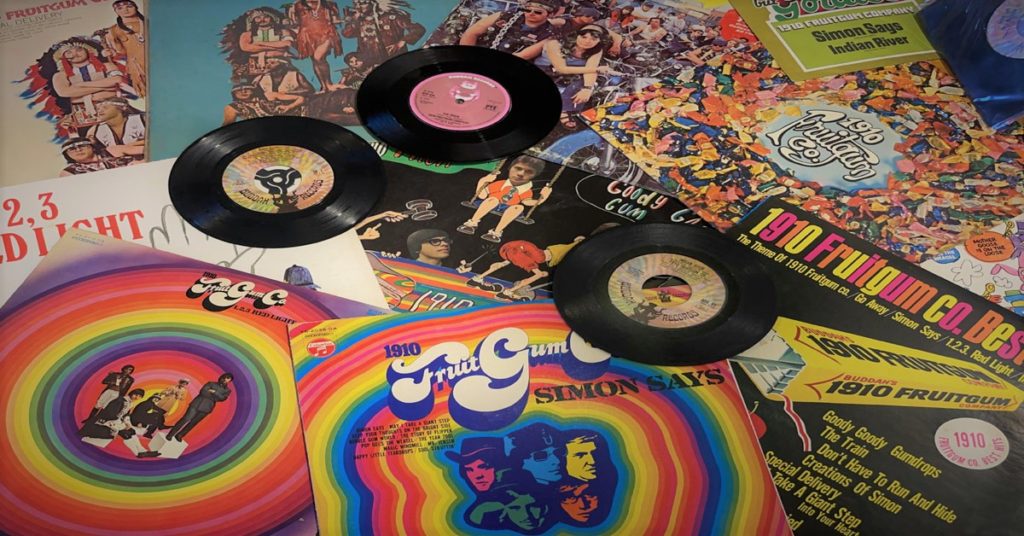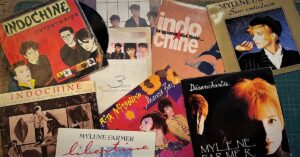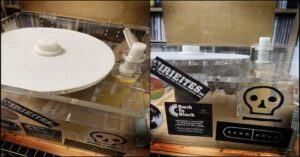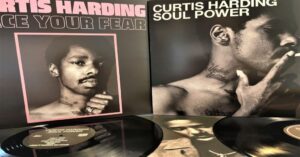Bit of a change of pace this week. This is one of my guilty pleasures. They’re not the most original bunch of guys on the block, but they make me smile.
I should probably set the scene.
When I was a kid, we had tons of 7” records at the house. My mom and dad (though mostly it was my dad) used to buy lots records when they were teenagers, and after they were married and had kids of their own, they continued to buy all the latest songs. As the musical styles changed, though, they bought less singles for themselves and more for me. Growing up surrounded by all those singles was a big influence on me and my eclectic musical tastes! Some of my favourites were my dad’s original copy of Del Shannon‘s Runaway and my mom’s old copy of Ritchie Valens‘ La Bamba with Donna on the other side (not sure which was the A-Side, but I knew which song I preferred!). We also had a lot of Beatles, Beach Boys, and Dave Clark Five on 7”; Capitol Records with the yellow and orange wave. Among all these little 7” treasures were some records that meant a lot to me as a kid, though maybe not so much to my parents or their friends! These were the records with the little Buddah on the label.

I didn’t know it at the time, but the style of music was known as bubblegum pop.
So the story goes, producers Jerry Kasenetz and Jeffry Katz claimed credit for coining the name “bubblegum”: bubblegum was disposable and was a product aimed at kids and teenagers. Buddah Records label executive Neil Bogart obviously liked it because he popularized it, using it as a marketing term for many of the acts on the Buddah label, and in the process created a genre of music that is beloved by millions and likely derided by just as many.
The most famous example of bubblegum pop would, of course, be Sugar Sugar by The Archies (is there anyone alive who has never heard that song?), but of all the bands that made names for themselves as purveyors of bubblegum pop, The 1910 Fruitgum Company was, and still is, my absolute favourite. They were also one of the most successful artists in the genre, having managed to get seven songs in the Billboard hot 100, with three of those being in the top 10 and two of them in the top 40. In Canada, three of their songs went straight to number 1 on the national charts.
Bubblegum pop is ostensibly mid-sixties style rock and roll, with great backing harmonies and simple melodies, and aimed directly at the teenage record-buying public. Like it’s sister-style Sunshine Pop that dominated the early seventies, bubblegum pop tended to be happy in the extreme with lyrics that usually referenced some kind of sweet confection. In the case of the 1910 Fruitgum Company, many of the songs also referenced children’s games. As a kid, I loved it! As an adult, with grown-up worries and problems, it’s silly enough to make me forget my problems and smile. Musically and thematically, it was likely a great balm to the turbulent times of the late sixties.
The songs were short (usually closer to 2 minutes than 3), the melodies were good, the lyrics were simple, and they were easy for kids to sing along to without worrying that it meant too much beyond what it said on the surface. The 1910 Fruitgum Company sang about things that, as a little kid of 4 or 5 years old, I could kind of relate to! They sang about Goody, Goody Gumdrops, Pop Goes the Weasel, and being an Indian Giver. They also sang about playing schoolyard games like May I Take a Giant Step, 1,2,3, Red Light, and of course, Simon Says. In fact, most of the song titles looked like they might have been written by preschoolers.
Needless to say I had all of these on 7” and somehow I managed to get my dad to buy me a couple of the actual albums as well. These obviously have made an impression because I can still remember several occasions where I was lying on the floor listening to this song or that song, or just looking at the album cover while the record was spinning on my crappy pink plastic portable player (I have vivid memories of staring at the cover for the “Indian Giver” album and thinking they looks so cool, hahaha).
These guys were making music that was fun, catchy, and good to dance to. Their songwriters were also using the childish lyrics in a way that was very much common in the sixties, when young adults were still considered children by many people, and treated as such. The vast majority were just silly and disposable, yet they were sung with complete sincerity, which is probably part of the charm.
The music is goofy, there is no doubt, but despite the silly lyrics, or indeed perhaps because of them, the songs have stayed in my heart. As a kid, I thought they were GREAT, but as an adult I am highly amused by how many double entendres there were. I can still remember most of the lyrics to all of their hits, though now I actually realize that pretty much every single one of them was about getting laid… or stoned… or both.
Among the 1910 Fruitgum Company records in my collection is a particularly rare one, which seems to consist of tracks recorded in the late 60s but never released on any of the Buddah albums or singles. Of course, being such a rarity it isn’t available on streaming services! Released on DiscAZ (in France) and on Hansa (in Germany) and titled simply “The 1910 Fruitgum Company” , it also came out in Japan on the Columbia Records label with the title “Happy Song”, but I have seen no indication that it was released anywhere else. By the time the album was released in 1970, bubblegum pop had grown a bit long in the tooth, and was already being replaced in the hearts and wallets of the record buying public by sunshine pop (which felt similar thematically but was far more slick and polished sounding). I have no idea how this album managed to get released, to be honest, but I am really glad that it did! It includes quite a few gems that are a hoot.
Even though it feels like a compilation of sorts, there isn’t a single hit on it, and I don’t believe any of the ten tracks were ever released as a single. As an album, though, it is actually one of the strongest collections of tracks ever released from The 1910 Fruitgum Company! There isn’t a bad track on it. Some of my favourites include Bingo, The Clock, Lawdy, Lawdy, and the quite obviously named Mary Wanna, whose title alone suggests to me why that particular song wasn’t released in the States. It’s also this latter track which leads me to think that maybe these guys were probably having a good time, getting high, making a living, and performing songs that made them laugh.
Also leading me to believe they were into the counter culture of the sixties despite their image are some of their B-sides (tracks on the flip side of the original 7” singles, which often didn’t appear on albums). Many of their original 7” singles had exclusive B-Sides on them and some of these B-Sides reveal a freaky side to the band. Sometimes the B-sides tell you more about a band than their publicists or the A-sides do! Two of the B-Sides that I know of are actually backwards tracks (Pow Wow and Candy Kisses) which is already pretty freaky for 1968. Played backwards (AKA the right way) neither is particularly good, but they are fun. Pow Wow is an obvious demo with the band just goofing around and singing about the kids TV show “Howdy Doody” and the other track, Candy Kisses is just a short electric guitar-solo freak-out jam; not what you would usually expect from the guys who sang Simon Says and Goody, Goody Gumdrops!
Speaking of Simon Says, the original B-Side on my 7” single is a track called Reflections From the Looking Glass which sounds like a completely different band! It’s pure sixties psychedelia. I’m obviously not alone in thinking this B-Side was a great track because it was included on the 2001 CD release, “The Best Of The 1910 Fruitgum Company: Simon Says”. I was shocked but thrilled to find it available on Spotify!
Despite childish music and laughable lyrics, the playing on their albums is tight, as are the vocal harmonies; no wonder since they actually toured with The Beach Boys in 1968! Check out the sweet background harmonies on a tracks like (Play Our Song) Mr. Music Man, Please Me, Tease Me, or Bubble Gum World and you’ll see they definitely knew what they were doing. The musicianship on display is first class, despite the silly lyrics and melodies.
No matter how you feel about The 1910 Fruitgum Company or bubblegum pop in general, there is no denying that it is infectious and fun, and that it had an influence of future generations of music makers. Don’t believe me? The Ramones covered the Fruitgum’s Indian Giver and often wore their love of bubblegum pop on their sleeves. With simple lyrics and melodies, great hooks, and upbeat tempos, bubblegum pop very easily translated itself into punk rock towards the end of the seventies, and into new wave in the eighties. In the nineties, whether they knew it or not, a lot of power pop owed its existence to the bubblegum pop of the late sixties.
Not bad for something that was so named because it was disposable. I’ve included a handful of tracks by other bubblegum pop artists at the end of this playlist. Hope you enjoy!
What do you think? Had you heard of bubblegum pop or of The 1910 Fruitgum Company before? Are you a fan? I’d love to hear from you!
Have I missed anything? Are there any songs I should have included in our playlist? Drop me a line in the comment section below! Remember to subscribe so that you don’t miss our next monthly (ish) post (We’ll never bother you more than once a month). PLUS! subscribers get a discount on any purchase made from us.
We are not affiliated in any way with any of the products or merchants mentioned in this review. Any suggestions and links are for your convenience only.
#music #vinyl #vinylcollection #1910fruitgumco #bublegum #myvinylcollection #recordcollection #myrecordcollection #musicboxtw #Taiwan #Chiayi #台灣 #嘉義 #黑膠唱片 #音樂




